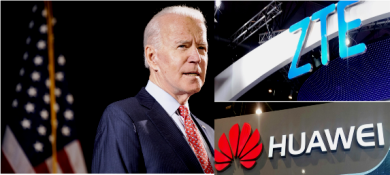Many have speculated on what a Biden presidency would mean for companies like Huawei and ZTE. Many articles are based on messages from the likes of Huawei’s Vice President Victor Zhang who wants policymakers to believe that decisions to restrict Huawei were not made with an objective assessment of the security of its networks.
Huawei has cultivated a narrative that it’s the innocent victim of a trade war brought on by an unpredictable President. Indeed, Huawei suggests that Biden would adopt a more friendly China policy. To evaluate implications for mobile operators, this research note examines Huawei’s narrative and historical US policy toward Huawei.
The historical facts
Huawei emerged in the US in 2005 in an intellectual property lawsuit with Cisco, and Huawei was mentioned in a report of Congress’ bipartisan US-China Commission (USCC) in the same year. In 2009, the USCC described Huawei as an extension of the Chinese military. Security officials in the first term of Obama/Biden Administration were concerned about Huawei.
A comprehensive bipartisan report on Huawei was issued in 2012 by the US House of Representatives Permanent Select Committee on Intelligence. The investigation included a visit to the company’s Shenzhen headquarters and an extensive interview with Huawei’s leadership. Huawei could not provide complete information on its corporate structure and decision-making process; it admitted to having a Chinese Communist Party Committee within the company but would not disclose the members’ identity; it could not provide evidence that it is independent of the Chinese government nor that its US operations were independent of its Chinese headquarters, undermining its claims that it’s an independent subsidiary.
Huawei could not answer questions about historical ties to the Chinese military, preferential treatment by the government for tax fraud abuse, or its relationship to foreign consulting firms. Such findings have informed the appropriations process for the US military and federal government, and as such, the National Defense Authorization Act (NDAA) bars the use of Huawei and ZTE equipment for military communications as well as products by Hytera, Hangzhou Hikvision, and Dahua for video surveillance. The House findings are corroborated by the recent Senate Committee on Homeland Security & Government Affairs, Permanent Subcommittee on Investigation’s Majority and Minority Staff Report – Threats to U.S. Networks: Oversight of Chinese Government-Owned Carriers.
While President Trump may have added Huawei to the Department of Commerce Entity List in 2019, US policy on Huawei predates President Trump by almost two decades. A report from US Department of Defense reveals that it had kept a list of companies affiliated with the Chinese government as a requirement of the 1999 NDA. That list, which includes Huawei, was not made public until earlier this year.
Nations make their own decision based on their experience
The story of Huawei is not about trade policy; it’s about security policy, and it reflects a long-running discussion nations have held about telecommunications as critical infrastructure. Just as NATO does not buy Chinese fighter jets, many countries conclude that the use of Huawei, a Chinese military company, is a security risk. In addition, many companies, some victim of IP theft, are concerned about their intellectual property being processed, stored, and transported on Chinese networks.
The Entity List designation denies Huawei access to 5G components, Google Mobile Services, and other advanced technologies. This has put Huawei under financial and supply chain pressure to deliver products and services. To adapt, Huawei has sold its Honor smartphone division for $15 billion in cash to Chinese state government investors.
The combination of COVID-19, China’s abuse of human rights, and China’s suppression of democracy in Hong Kong have changed the world’s perception of China. Negative views about the country and its leader General Secretary Xi Jingping have reached all-time highs from people in Australia, the United Kingdom, Germany, the Netherlands, Sweden, the United States, South Korea, Spain and Canada. As China has become increasingly aggressive, China is no longer considered a “responsible stakeholder”; companies like Huawei have been exposed for their close association with the Chinese government and military.
Strand Consult has in the report Fact Check Huawei: What You Need to Know to Understand its Corporate Communication documented Huawei’s statements about its relationship with the Chinese government and Huawei’s actions when countries have expressed concerns about security, including threats of retaliation if Huawei equipment is not purchased and requests to governments to censor media which make critical stories about Huawei.
Strand Consult’s new report You’re Not Welcome: An Analysis of Thousands Foreign Technology Companies Blocked by China Since 1996 describes how and why the PRC has systematically restricted thousands of foreign internet technologies like online news and media outlets, social media platforms, virtual private networks, content delivery networks, mobile applications, telecommunications equipment, cloud services, and other technologies.
Trump vs. Biden
Tom Wheeler, the Chairman of the Federal Communications Commission under President Obama said,
Put simply, US policy to Huawei and ZTE is bipartisan, and it precedes Trump by many years. The only different is that Trump was more vocal about it.
Joe Biden is unlikely to change policy to Huawei and ZTE. The conclusions that Huawei is a security threat comes from multiple US government agencies in different branches of government. Many of the analysts who develop the research are career employees who have served under multiple administrations. As such, the policy can only be described as bipartisan.
During his campaign, Biden suggested that Trump was soft on China. Biden billed himself as promoter of racial equality and restorer of relations with US allies. In this regard, Biden can has at least two cards to play against China. Biden could have success by communicating that US and EU companies get the same conditions in China that Chinese companies get abroad. This will comport with Germany’s Angela Merkel and France’s Emmanuel Macron.
Biden also has the perceived support of many US civil rights groups. He could parlay the conversation about racial equality into demands on stopping human rights abuse in China. In so doing, he can justify continued restrictions against China for their abuse of human rights and build solidarity with US communities.
Biden is unlikely to send a welcome gift to Huawei for the Chinese New Year.
Huawei’s response in the short, medium, and long term and what it means for mobile operators
Huawei is in a panic, hit hard by US restrictions on the one hand, and the increasing number of countries and companies opting out on the other. Huawei has hired experts like Compass Lexecon, Oxford Economics and the Center for Economic and Market Analyzes (CETA) and former politicians across EU to support their narrative. These are classic tools from the corporate communication toolbox to change perception, but they don’t change the underlying facts on security.
Strand Consult can well understand that operators may be confused, especially if they read the “analyses” and recommendations that Huawei places in the media. Having said that, operators must ask themselves some important questions.
First, what do customers think? What confidence do customers have with their data on a Chinese network? How have business customers experienced China? Will the mobile operator lose my competitive edge if its competitor goes with a non-Chinese solution?
Second, what is important to shareholders? What do the defense and intelligence authorities know that mobile operators do not? Can mobile operators certify to my shareholders that there is no risk to use Chinese solutions, when authorities say there is? What are the security compliance costs for using a Chinese network?
These are issues that are not so complex when looking at the many decisions mobile operators must make every day. Operators around the world face a technology shift that makes it easy and cheap to replace Huawei and ZTE with equipment from other suppliers.
Strand Consult has no doubt that Biden’s policies for Huawei and ZTE are unlikely to be more lenient. In fact, he could even make the policy tougher and build greater alliance with European and other allied governments. And the end of the day, the Huawei debate is about security and human rights, not trade.
Strand Consult has followed Huawei closely and has performed detailed fact checks on the statements Huawei feeds to the media. To date, neither Huawei nor its hired experts can identify factual errors in Strand Consult’s extensive research. Strand Consult’s goal is to create the transparency that Huawei is fighting against.
To know more about this subject, see Strand Consult´s reports and research notes about China and cyber security.





























